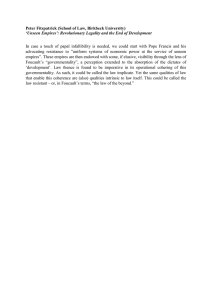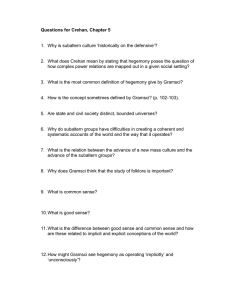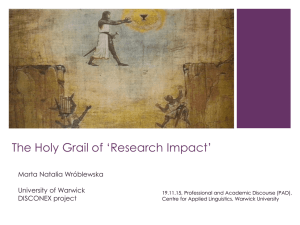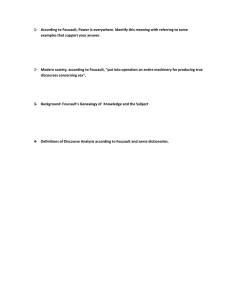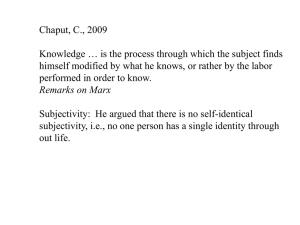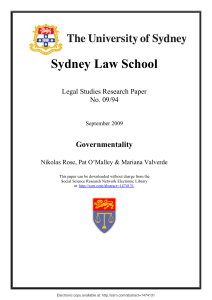Concluding Lecture I. End of Foucault:
advertisement
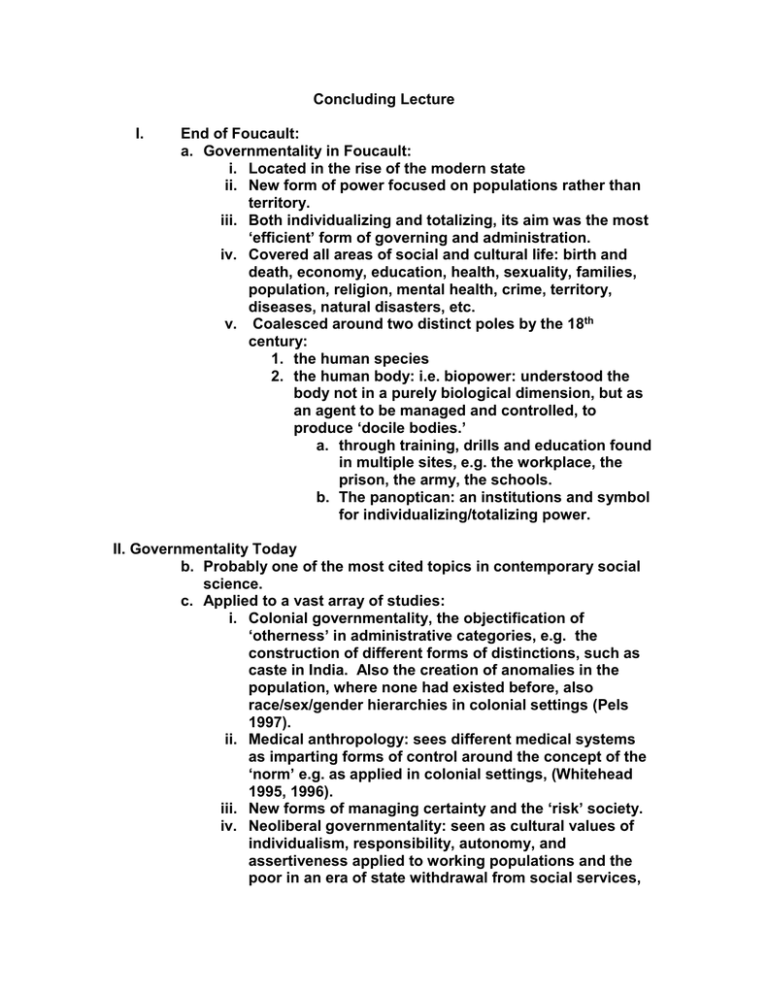
Concluding Lecture I. End of Foucault: a. Governmentality in Foucault: i. Located in the rise of the modern state ii. New form of power focused on populations rather than territory. iii. Both individualizing and totalizing, its aim was the most ‘efficient’ form of governing and administration. iv. Covered all areas of social and cultural life: birth and death, economy, education, health, sexuality, families, population, religion, mental health, crime, territory, diseases, natural disasters, etc. v. Coalesced around two distinct poles by the 18th century: 1. the human species 2. the human body: i.e. biopower: understood the body not in a purely biological dimension, but as an agent to be managed and controlled, to produce ‘docile bodies.’ a. through training, drills and education found in multiple sites, e.g. the workplace, the prison, the army, the schools. b. The panoptican: an institutions and symbol for individualizing/totalizing power. II. Governmentality Today b. Probably one of the most cited topics in contemporary social science. c. Applied to a vast array of studies: i. Colonial governmentality, the objectification of ‘otherness’ in administrative categories, e.g. the construction of different forms of distinctions, such as caste in India. Also the creation of anomalies in the population, where none had existed before, also race/sex/gender hierarchies in colonial settings (Pels 1997). ii. Medical anthropology: sees different medical systems as imparting forms of control around the concept of the ‘norm’ e.g. as applied in colonial settings, (Whitehead 1995, 1996). iii. New forms of managing certainty and the ‘risk’ society. iv. Neoliberal governmentality: seen as cultural values of individualism, responsibility, autonomy, and assertiveness applied to working populations and the poor in an era of state withdrawal from social services, (Dunk, Kingfisher). v. Spatial governmentality and urban anthropology (Low). vi. Sustainable development and eco-rationality vii. Perhaps its very generality leads to some problems, i.e. if governmentality and power/knowledge are EVERYWHERE, then do we have a tautological explanation? (Not that tautologies are not be useful, but are we missing something else that might also be important, e.g. relations of capital, value, labour, gender, small-scale societies that still retain some autonomy, etc?, e.g. of sati and its interpretations in India). II. Normalization: a. Governmentality not only institutes an anonymous, totalizing and individualizing form of power, it is also connected to procedures of ‘normalization’. b. Normalization = the system of finely gradate and measurable intervals in which individuals can be distributed around a norm. c. It is different from religious dictates (based on absolute rules) and laws, but comes to supplant both. d. It creates the ‘expectation’ of what individuals should and should not due, but also creates ‘anomalies’, e.g. the delinquent, the pervert. e. Normalization is a major technique of governmentality in the modern age. III. Foucault and Gramsci: a. Foucault argued that forms of governmentality preceded capitalism, but was not interested in capitalism per se. b. Gramsci: interested in how power was distributed throughout a capitalist society. c. Did not see the economy as being determinant of meaning, but thought that it produced inequalities, not only in economy, but also in access to ‘the symbol’. d. Formulated the concept of ‘hegemony’ to understand the ways in which power operated symbolically and was differently distributed, not a decentred concept of power, as in Foucault. e. Hegemony is a combination of coercion/consent, but cannot exist without either. f. Differentiated between subaltern and elite perspectives, saw subaltern consciousness as always on the defensive against attempts to deny it reasonable agency and meaning. g. Unlike power/knowledge, hegemony is a concept that is always shifting, depending upon historical constellations of power and privilege and attempts to undermine it. h. Hence, hegemony includes practice, and the practical possibility of ‘subalterns becoming sovereigns.’ Hegemony is never ‘total’ or ‘totalizing’. Foucault: totalizing refers to universalizing modes of thought, but seems to substitute totalizing in practice with universality in aspiration. IV. Roseberry, (Gramsci) and Geertz: a. Roseberry: criticizes Geertz for ignoring social and cultural differentiation in his semiotic interpretation of a Balinese cockfight. b. Also missing is a concept of culture as a social process; culture is not only what is written, but also the writing of it. c. Williams: cultural creation is also a ‘material’ production, producing both the ‘material’ and the ‘ideal’, e.g. the concept of tradition that is tied to relations of domination and subordination. Hegemony = a dominant or selective ‘tradition.’ d. It is also meaningful: it touches every aspect of both the elites and the subalterns.
